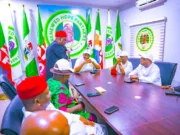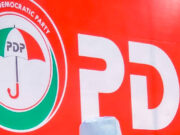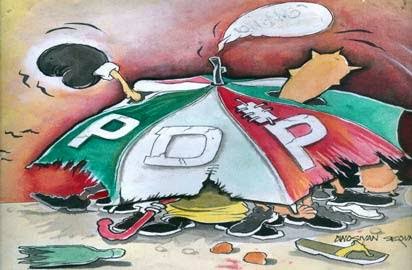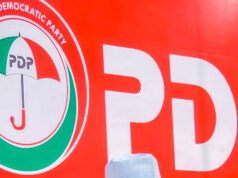
As Nigeria gears up for the 2027 general elections, the Peoples Democratic Party (PDP) finds itself in the middle of a political storm that threatens to tear apart its ranks.
Once the dominant force in Nigerian politics, the party has been struggling to maintain cohesion, as internal divisions, leadership tussles, and regional disagreements continue to erode its foundation.
The slogan “Power to the People” rings hollow to many of its followers, as the party grapples with a myriad of challenges that could significantly impact its chances at the polls.
 Advertorial
Advertorial
The Leadership Crisis:
At the heart of the PDP’s turmoil is a leadership crisis that began shortly after the 2023 general elections. While the party managed to hold onto several key states, it failed to reclaim the presidency, which deepened existing fault lines.
The contentious resignation of its National Chairman, Senator Iyorchia Ayu, and the emergence of Ambassador Umar Damagu have left the party divided.
Efforts to elect a new leader acceptable to all factions have repeatedly stalled, with various interest groups vying for control.
 Advertorial
Advertorial
The North-Central geopolitical zone, which has traditionally provided strong support for the PDP, has been at the forefront of the demands for party chairmanship.
However, other regions, particularly the South-West and South-East, have pushed back, calling for a more equitable distribution of key party positions.
These competing interests have left the party without a clear direction as the election approaches.
Regional Discontent:
The South-East and South-South regions, formerly PDP strongholds, have become increasingly disillusioned with the party’s leadership.
 Advertorial
Advertorial
In the South-East, there are growing calls for more representation in the party’s decision-making processes, with many leaders in the zone arguing that they have been sidelined for too long.
Some governors and influential leaders have even hinted at a possible realignment with other political forces if their demands are not met.
In the South-South, the situation is equally tense. Former Rivers State governor and currently the FCT minister, Nyesom Wike, who was a key figure in the 2023 elections, has continued to wield significant influence in the region.
 Advertorial
Advertorial
However, his often combative approach to national party issues has alienated some party members, leading to a factional split in the zone. Wike’s insistence on maintaining control over the South-South PDP machinery has caused friction with other governors in the region, further deepening the crisis.
Factional Battles;
One of the most dangerous developments for the PDP is the rise of factionalism within the party. With multiple factions claiming legitimacy, the party has struggled to present a united front.
 Advertorial
Advertorial
The emergence of a parallel PDP faction, dubbed the “New PDP,” has also complicated matters. This faction, led by a group of younger, more progressive politicians, is calling for radical reforms within the party, including a change in leadership and a shift away from the old guard.
They argue that the PDP has lost its way and that only a complete overhaul can save the party from electoral disaster in 2027.
However, the traditional power brokers in the party, many of whom have held sway for decades, are resistant to these changes.
 Advertorial
Advertorial
Remember, PDP lost in the Edo governorship election recently conducted.
The upcoming Ondo governorship election has become a flashpoint for the PDP’s internal crisis.
The division in the party has threatened to weaken the party’s chances of reclaiming the state from the ruling All Progressives Congress (APC). With just few weeks away from the election, the PDP in Ondo remains fractured, with no clear resolution in sight.
 Advertorial
Advertorial
The Risk of Defection:
As the PDP struggles to keep its house in order, there is growing speculation that several high-profile members could defect to other political parties.
In particular, the ruling APC has been actively courting some PDP members, offering them positions and influence in exchange for their loyalty. Should the defections continue, the PDP’s already shaky electoral prospects could be further weakened, especially in key battleground states like Rivers, Akwaibom, Adamawa etc.
Governors and party leaders who feel marginalized or disillusioned with the ongoing crisis may seek greener pastures, which would leave the party in an even more precarious position.
 Advertorial
Advertorial
The risk of a mass defection looms large, as many fear that without immediate action to resolve the internal disputes, the PDP could enter the 2027 elections as a significantly diminished force.
What’s Next for the Party?
The 2027 elections represent a critical juncture for the PDP. If the party can resolve its internal divisions and present a united front, it stands a chance of making significant gains. However, if the crisis continues unchecked, the party risks becoming a shadow of its former self, with little hope of regaining its lost glory.
Time is running out for the PDP to heal its wounds and refocus its efforts on the elections. The NEC meeting scheduled this week will be a decisive moment, as the party’s leadership must either find a way to reconcile the various factions or face the real possibility of losing more ground to the APC, Labour Party, and other emerging political movements.
As the PDP teeters on the edge, the question remains: Can the umbrella that once shielded millions from political storms hold together, or will it tear apart under the weight of its own internal struggles?
The coming months will provide the answer, as Nigeria watches closely to see if the party can weather the storm.

















